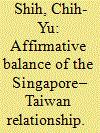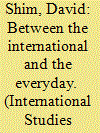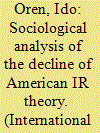|
|
|
Sort Order |
|
|
|
Items / Page
|
|
|
|
|
|
|
| Srl | Item |
| 1 |
ID:
151250


|
|
|
|
|
| Summary/Abstract |
The relational turn of IR stresses the processual constitution of the state. The indigenous theory of Chinese IR adopts the relational turn but contends that the Chinese experiences are distinctive. Relying on the case of Singapore-Taiwan relationship, this paper argues that the Chinese relationality attests to a bilateral sensibility that does not confront the relational turn in general, which is multilateral. The case further contributes to the relational turn in showing non-security and affirmative components of relationality to the extent that the studies of the relational turn have remained embedded in the security concerns. The case applies the theory of “balance of relationship,” in which nations can practice self-restraint not in response to unilateral strategic calculus or multilateral rule making, but to bilateral reciprocity. The balance of relationship of the two proceeds at both the statist and the personal levels, introducing the affect of passion to the relational turn.
|
|
|
|
|
|
|
|
|
|
|
|
|
|
|
|
| 2 |
ID:
151246


|
|
|
|
|
| Summary/Abstract |
The connection between the everyday and the international has received increasing attention in critical IR in recent years. As many contributions aim to rethink the international in terms of the everyday, the mundane and the ordinary become a site of geopolitical analysis. The paper’s central idea is that we, as academics and human beings, constantly face what can be called an international political sociology of the everyday in world politics: How is life in “distant” places? Who lives in these places? And, what are the people doing “over there”? By reflecting on how we obtain an idea of the everyday of certain places, this paper shifts its focus on representations or, more precisely, imaginations of home and the everyday for particular audiences. Precisely because the mundane can simultaneously be anything, everything, and nothing, it is important to turn to the practices and, in this vein, to the (geo)politics of mediating the everyday to us. In this regard, the paper provides an interpretive reading of two aesthetic texts—a film and a photographic essay—with the purpose of addressing imaginaries of home, the special senses, and venues of belonging wherein the everyday takes place, as particular sites of the international. In this way, the paper contributes to current efforts to decentralize current conceptions of the international.
|
|
|
|
|
|
|
|
|
|
|
|
|
|
|
|
| 3 |
ID:
151249


|
|
|
|
|
| Summary/Abstract |
The image of a nation is crucial in the conduct of international relations. As a rising power, China is increasingly concerned about its image, due to which it is increasingly investing into its public diplomacy. Public diplomacy, broadly understood as a country’s engagement and communication with foreign publics, has become one important part of China’s overall diplomacy in recent years. This article introduces the Chinese debates on public diplomacy. In doing so, it helps to better understand how China sees itself in the world (mainly misunderstood), how China perceives the international environment (potentially hostile), and how China wants to be seen by the outside world (as a friendly, peaceful, and reliable partner). Furthermore, this article demonstrates that in China, public diplomacy is understood more as an instrument to fulfill strategic and functional purposes and less as an instrument of mutuality. Although the non-Chinese discourse focuses on mutuality, exchange, and reciprocal communication, China is more concerned with getting its message out and convincing the world of its benign intentions.
|
|
|
|
|
|
|
|
|
|
|
|
|
|
|
|
| 4 |
ID:
151247


|
|
|
|
|
| Summary/Abstract |
Proposed solutions to INGO accountability problems frequently conflict. Dominant scholarship focuses on promoting self-regulation within the INGO community, while an alternative body of literature focuses on generating external incentives for accountability, using state/IO regulations or conditional funding. This article analyzes the causes and implications of this disjuncture. We first show that self-reform requires a high degree of INGO autonomy, whereas external reform requires a high degree of donor control. We next conceptualize INGO autonomy as a price funders pay for INGO services. Using this framework, we show that INGO self-reform implicitly assumes that the demand for INGO services outstrips the supply (scarce supply), forcing funders to pay a high price in terms of INGO autonomy. Proposals for external incentives assume the opposite (abundant supply), such that competition among INGOs effects a downward pressure on autonomy, increasing donor control. These findings reveal that solutions to NGO accountability cannot be an “all of the above” proposition. Moreover, because demand for services may vary between sectors of NGO activity, effective solutions need to be sector-specific, rather than universal.
|
|
|
|
|
|
|
|
|
|
|
|
|
|
|
|
| 5 |
ID:
151248


|
|
|
|
|
| Summary/Abstract |
What do democracies do by refusing to trade with dictatorships? The conventional view assumes that: (1) a democratic refusal to trade with dictators is an exception that requires special justification; (2) following customary international law, dictators should normally be recognized as legitimate in selling their peoples' resources; (3) a refusal to trade is one policy option which democratic governments may choose; and (4) a refusal to trade succeeds only when contributing to change in the “target” country. Focusing on natural resource trade, I develop an alternative view which holds that: (1) democracies owe no special justification for refusing to trade; (2) dictators have no right to sell their peoples' natural resources; and (3) democratic refusal to purchase natural resources from dictators should be the norm. It follows that (4) such refusal achieves an important moral goal simply by preventing corporations based in democratic countries from partaking in crime.
|
|
|
|
|
|
|
|
|
|
|
|
|
|
|
|
| 6 |
ID:
151245


|
|
|
|
|
| Summary/Abstract |
In recent years the centrality of grand, paradigmatic theory in American IR has eroded, with the vacuum being filled by largely atheoretical “hypothesis-testing” research. Although a heated debate has emerged on whether it is good or bad for IR, hardly anyone has tried to analyze this trend. I offer an analysis grounded in a conceptual framework elaborated by sociologist Richard Whitley. In the 1980s and 1990s IR approximated the type of social organization Whitley labeled “polycentric oligarchy”—a hierarchic structure dominated by leaders of competing schools, toward which scholars orient their research. In recent years the field has become more of a “fragmented adhocracy.” Its reputational hierarchy has become more fluid and, concomitantly, its intellectual output has become more fragmented, more empirical, and less oriented toward a theoretical center. To account for this change, I discuss three external forces that reduce American IR's “reputational autonomy”: the corporatization of American higher education; a surge in the availability of research funding from the Pentagon and other defense agencies; and the enduring embeddedness of American IR in the political science discipline. To strengthen my argument, I compare American IR to its Australian counterpart on these three dimensions.
|
|
|
|
|
|
|
|
|
|
|
|
|
|
|
|
|
|
|
|
|